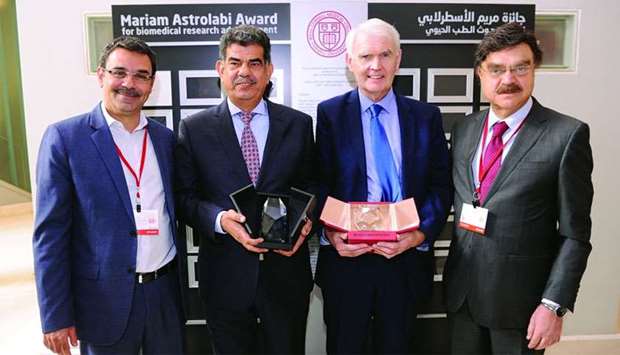Researchers from leading institutions across Qatar convened at Weill Cornell Medicine-Qatar’s (WCM-Q) ninth annual research retreat to discuss the latest developments in biomedical science.
More than 200 leading scientists and students from WCM-Q and other national stakeholders attended to share their projects, discuss ongoing trends in biomedical research, listen to lectures from fellow investigators and take part in a research poster competition.
Diverse areas of research were covered at the event, including diabetes, obesity, neurological disorders, genomics, breast cancer, the ecology of Qatar, epilepsy and cardiovascular disease, among many others.
This year’s edition of Research Retreat had a special focus on the translation of discoveries and innovations into commercially successful enterprises.
Dr Javaid Sheikh, dean of WCM-Q, said, “Qatar has made enormous strides by establishing a very successful and active biomedical research sector in the county. The next challenge is to attract sufficient venture capital from the private sector to allow small and medium enterprises to flourish and grow, which is essential for taking innovations from the lab to the market place. This is a crucial step if Qatar is to make the leap to a sustainable, knowledge-based economy.”
The event also featured for the first time the announcement of the newly created WCM-Q Mariam Astrolabi award for Biomedical Research Advancement, named after Mariam Ijilyah Astrolabi, an Arab Muslim engineer from Aleppo who pioneered the development of the navigational instruments known as astrolabes in the 10th century CE.
The inaugural award was presented to Dr Abdul Satter al-Taie, executive director of Qatar National Research Fund (QNRF) for the central role QNRF has played in channelling vital funding to biomedical research.
Dr al-Taie said: “ I believe what has been done with research in Qatar so far is marvellous. We are now looking forward to the most important and most challenging phase, in which we must convert our ideas into impact by bringing about the realisation of our collective research and innovation to support the country and its move to a knowledge-based economy.”
The keynote address was given by Dr Richard O’Kennedy, vice president for Research, Development and Innovation at Qatar Foundation and vice president for Research at Hamad Bin Khalifa University.
Drawing on his experience in helping to establish the successful biomedical and pharmaceutical sector in Ireland, Dr O’Kennedy said: “Ireland used to have a slogan that it was the best little country in the world to do business in; I want people to have the slogan in Qatar that this is the best place in the world for people who want to take good ideas and turn them into commercial opportunities.”
The Research Retreat featured a total of 94 poster presentations by research specialists, students and postdoctoral fellows highlighting the findings of projects conducted over the past year.
The event closed with the announcement of the winners of the poster presentation in three categories.
First place in the student category was awarded to second-year medical student Heba Altarawneh for her poster presentation titled ‘Quantitative Comparison of Naion and Poag Using Fdcot Scan Parameters’, which investigated vision loss.
The first place in the research specialists’ category was awarded jointly to Aisha Madani, for a project about inflammation-regulating genes, and Iman Achkar, for a project on the impact of a combination of a cytotoxic drug and a metabolic agent on cancer cells.
In the postdoctoral fellows’ category, Dr Yasser Majeed was first with a poster titled ‘Sirt1 Deacetylase and Myc Oncogene Interaction as a Regulator of Adipogenesis’.

